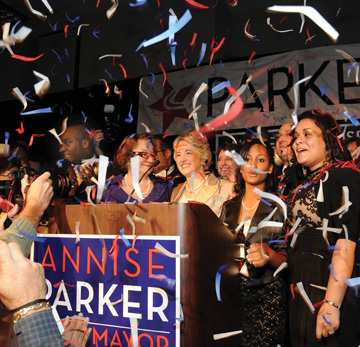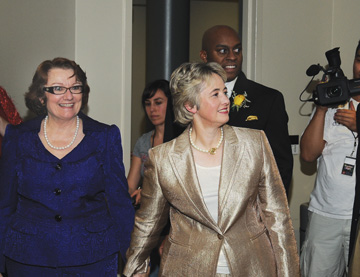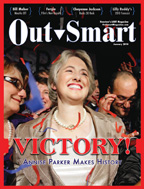An overnight media phenomenon, Annise Parker takes things all in stride
by Brandon Wolf
“This is really the first chance I’ve had to relax,” says Houston’s Mayor-elect, Annise Parker, eight days after her historic election on December 12, 2009. She’s reserved time, however, on this Sunday morning to talk with OutSmart about her post-election life, her thoughts on the past election, and the private moments of the biggest evening of her political career.

“Today will be the first day when I haven’t jumped out of bed early and been going non-stop until late in the evening,” Parker says. The relief is evident in her voice. As she reflects on the past week, she’s relaxed, open, and full of playful humor.
She confirms that she has read today’s Houston Chronicle, which features a front-page article entitled “The Story of Annise Parker.” Along with the story, there are several close-up pictures of her over the years. “It’s a gallery of bad hairdos!” she laughs.
How Life Has Changed
“The biggest change in my life is that I’ve already been assigned a security detail,” Parker notes. “I now have an entourage of security people, and I’m not used to having people around me all the time, everywhere I go.
“This isn’t the regular security detail that each mayor has,” Parker says. “This is the Dignitary Protection Unit. Mine is very heavy right now because of the unprecedented level of media attention, which is worldwide and off the charts. I’ve been traveling all over the city of Houston for years, and during 12 years in office, there was never a place that I have gone that I haven’t felt safe and welcomed. But we are aware that there are nut-balls out there, so the security is high at this point, until we can see how things shake out.
“I haven’t driven my own car since Election Day morning. It’s going to make it harder to do those personal errands—picking up the dry cleaning or stopping into the grocery store. And I won’t be able to hang out at Southland Hardware!”
Confidence on Election Day
“I’ve been very confident all the way during the runoff, but you never know until the last vote is counted,” Parker says. “When I saw the early-vote totals and that I was ahead of Mr. Locke, I began to breathe a little more easily. I knew the early vote would be very, very conservative, but there was no way to get a sense of the impact of the Steven Hotze negative, antigay push. His mail-out piece was targeted to very conservative, older Republican households. We saw a big surge of mail-in ballots as a result of his flyer.
“On Election Day, I was out all over the city in different places,” Parker recalls. “I knew that I was going to win Election Day handily. Still, the race was closer than any of us had anticipated. I had a substantial lead, and the polling all looked good—but the Hotze mailing had an impact. And turnout was down on Election Day because of the bad weather.
“I knew the inevitable was happening on Election Night, but still I couldn’t embrace it until Mr. Locke gave his concession speech. His staff called my staff and arranged a personal call. Our campaign had a suite at the Hilton Americas, and I took the call in a private bedroom. He graciously conceded, and asked if I would extend the courtesy of allowing him to give his concession speech before I gave my victory speech.”
Inside the Family Suite
“It was subdued excitement in the family suite that evening,” Parker says. “I was kind of sequestered with my partner, Kathy, and would come out periodically to visit with the family and so forth, and then retreat back into the bedroom of the suite, to confer with what I called my ‘war room’—the number crunchers and the political professionals. They were getting all the precinct totals. And at that point, there just wasn’t much one could do.
“My family interacted with each other throughout the evening, but I didn’t get to interact much with them. I was focused on the returns, becoming comfortable with the speech I was to make, getting dressed and ready, and waiting for a call from Gene Locke and dealing with it when it came. Two nights later I had dinner with my political consultant Grant Martin, and he was trying to gauge my emotions on Election Night. I told him I was still working on Election Night, even when I made that victory speech.
“After the call with Gene Locke, the first person to call me the Mayor-elect was Kathy,” Parker reveals. “The people who were the most excited were my campaign team. I was still working on my victory speech, because I had certain things that I needed to convey to all of Houston. I wanted to thank the people who had gotten me here, and reassure the people who didn’t that we would go on together.”
Preparing for the Big Moment
“My daughters spent time Saturday getting their hair and makeup done, and they had bought new dresses,” Parker says. “My mom and Kathy bought new outfits. It had been a long, hard fight, and this was a celebration. And here’s the mom-hood in me coming out—before we went downstairs, I noticed my daughters had upped their makeup!
“The first thing my mother said to me, when she knew that I was the Mayor-elect, was, ‘I wish your dad could be here to share this.’ The feeling among my family is universal—they all love me and they all think I’m smart and competent. But they are still astounded that I am a politician, knowing how shy I was as a child.”
For her speech, which has received international attention, Parker says she wanted her outfit to look sharp, professional, and flattering. She chose a suit with a golden sheen because this was a “golden moment.” “For jewelry, I borrowed gold earrings from Mariquita Masterson, a Houston jeweler. I want to showcase Houston in everything I do. I wore Masterson earrings at the first victory party in November.”
Parker had made notes to follow while giving her victory speech. It was written in advance and distributed to the media that were present at the event. The only line that was missing was her opening line. “I wanted to start with something to poke fun at all the frenzy about being the first lesbian mayor, but I didn’t quite know how to get there,” she says.
“Earlier in the evening, someone had told me that I was going to be the first Rice graduate to become mayor of Houston. At the last minute, it all came together for me—I would introduce myself as the first Rice graduate. Even Kathy didn’t know I was going to say that. When I began my speech saying that tonight was historic, Kathy thought, ‘Oh no, she’s really going to start off with the lesbian thing.’ She dropped her eyes down to my speech and saw where I had written the joke in at the top, and she relaxed.
“I know people were crying and hugging,” Parker recalls. “But I didn’t experience it that way—it was all kind of a blur for me—I wanted to touch Houstonians with that speech. I wanted them to get a sense of me, but also understand that I am now the incoming mayor and that I am in charge. So there were a lot of notes to be hit.”
“People Want to Touch Me”
“When I first walked into the ballroom earlier in the evening, it was absolutely packed,” Parker remembers. “I had a security detail around me already, but people were still giving me hugs. I had to tell the security unit that people wanted to touch me and hug me. It took some getting used to for them—it’s a very different atmosphere than with Bill White, Lee Brown, or Bob Lanier. People don’t go up to them and throw their arms around them. So the unit had to learn not to overreact.

“People want to touch me, partly because they know me, but particularly because I am a member of Houston’s GLBT community. They want that personal connection. As I said in my speech, I understand that I am a role model and a symbol for a lot of people, and I acknowledge it and embrace it. But it’s not why I’m the mayor-elect of Houston. It’s part of the whole, though. Especially for people who have been very wounded, it makes it special and very real to be able to touch me.”
Parker usually wears pierced earrings, but the earrings she chose for the victory party were clip-ons. “Shortly after I came into the room, someone gave me an especially big hug, and the left earring popped off. But I didn’t know it. The man I was hugging caught it, but there was such a crush around me, he couldn’t get to me to return it.” So Parker gave her victory speech wearing one earring.
After the speech was completed, she made her way over to the media on the other side of the room. “Someone else gave me a big hug, and the right earring popped off! I still didn’t realize it. But they caught it too.” Both supporters made sure the jewelry was returned to her suite. “I have very honest supporters,” Parker laughs.
Media Frenzy Begins
“On Sunday, I attended church services at Good Hope Missionary Baptist Church, a large African-American church on McGregor,” Parker says. “After that, it was wall-to-wall media the rest of the day and into the evening.”
“On Monday, I started with a 5:30 a.m. live broadcast, and then I did all the local news shows. It was back-to-back all morning. Then in the afternoon and evening, it was national and international media. All the major U.S. media contacted me. I also did interviews with media in Melbourne, Australia; a Japanese radio station; several Spanish language stations in South America with translation on the other end; and a long interview with a station in the Basque country of Spain.”
“It was, ‘Wow, you are a lesbian and you’re the mayor of Houston. But Houston is such a redneck place and how could this happen?’ It gave me an opportunity to show that Houston is not the place some people think it is, and allowed me to change how people view our city. It’s a sophisticated, global, international city—very, very diverse—very tolerant and welcoming. I’m a little overwhelmed by the media, but it’s also a great opportunity to talk about the city that I love.”
“Even my mother was interviewed after she returned to Charleston,” Parker relates. “The local paper interviewed her, and one of the news channels sent a camera crew to her house. So she called and said she was basking in my reflected glow, having a great time, enjoying her 15 minutes of fame as the mother of the mayor-elect of Houston.”
A Phone Call from the President
On Tuesday afternoon, Parker was being interviewed by CNN, when she felt a call coming through on her cell phone. “My campaign staff has trained me to hand my telephone to an aide whenever necessary, to keep it from buzzing when I am doing something in public,” she says. “But my phone was in my pocket—on silent mode. It was President Obama calling to congratulate me.
“I would have expected that he would have a staff-to-staff call placed. But instead he called himself and left a voice message. I didn’t realize it until 15 minutes later when I was listening to my messages in my car, on the way home. The ID didn’t show ‘White House,’ just ‘Private.’ The message was very straightforward and absolutely recognizable.”
Parker played the call for everyone in the car, and then played it again at home for her mother and her daughters. “I didn’t consider it a congratulatory call for just me—I wanted to share it with the whole team, who I thought would be walking on air. I played it a lot, and somehow it ended up on YouTube.”
The next day, Parker received a call from the White House. A very stern aide asked her how it got out on YouTube, and she said she didn’t know. The aide said the message was private. But Parker told him that there was no private information in it and she thought it was absolutely appropriate that she should share it with the team who helped her get elected. “I haven’t even been sworn in yet, and already I’ve had my hand slapped by the White House,” Parker says, with more amusement than penitence.
Looking Back on the Campaign
Parker says there were no devastatingly low moments during her 10-month campaign. “But there were frustrating moments,” she admits. “There were times the finance reports came out and I was being creamed in the fundraising.”
“Over and over, when I first went to the business community for support, I heard a variation of the same theme—‘We know you could do the job and you’d be a great mayor, but you are unelectable.’ I cannot tell you how many times I heard people who I respected and who had supported my controller race tell me that. And I thought, ‘How many elections do I have to win before I become electable in Houston?’”
The best part of the campaign for Parker was visiting her campaign headquarters. “From September on, it was filled with young people, 20 to 30 years old. They had energy and enthusiasm. They had great passion and belief in me. I know Mr. Locke and Mr. Brown had good campaigns, but their campaigns lacked that energy and passion.”
“The campaign had a plan and we worked it,” Parker says. After 12 years of service to Houston, I found that the kingmakers and so-called leaders of Houston were on the other side. I went out into the neighborhoods, and I kept getting the affirmation that people were going to vote for me and be with me.
“A lot of folks called or came up to me and whispered in my ear that they were gay or they had a family member who is gay, and they were so proud that I was running. Many said that they couldn’t acknowledge publicly that they were supporting me—especially African-American women. Many people wanted so much for me to win, because they had been rejected by their families, or had family members who had been ostracized. Others told me that there were people who were now dead that they wished had been able to witness my campaign.”
Being Out and Smart

“Clearly I am ‘out,’” Parker notes. “I didn’t think anyone would be voting for me who didn’t know that I was out. For 12 years, that was part of what people knew about me, but not what people thought about me. Now we are back to a phase where everyone is focusing on the gay issue again.
“The ‘smart’ part comes when I get through the inauguration and take the reins of government. People will see how I’ve crafted a team and put it into place. This is a tough time to become mayor of Houston because of the economy. But I intend to run a tight ship, and the results that my team gets will be the answer.”
Parker is excited that she will be seeing her sister Alison who lives in Georgia and several nieces and nephews at the inauguration on January 4, 2010, along with her mother, Kay. She also knows that Fred Phelps will be demonstrating against her during the swearing-in ceremony at the Wortham Center.
“There are two signs that you’ve made it in America,” says Parker. “The first is if you’re picketed by Fred Phelps. And the second is if you’re the subject of a joke on The Jay Leno Show.” She chuckles as she repeats the Leno joke: “There is a new lesbian mayor in Houston—and she is the only woman who has been in the media the last two weeks who hasn’t slept with Tiger Woods.”
With her eyes clearly set on the tasks ahead, Parker says, “I am looking forward to the time when we get past the ‘oh-my-gosh-the-gay-mayor-of-Houston’ and I can just be ‘a great mayor’ for the city of Houston.”
Brandon Wolf also interviews Sarah Ferguson in this issue of OutSmart magazine.










